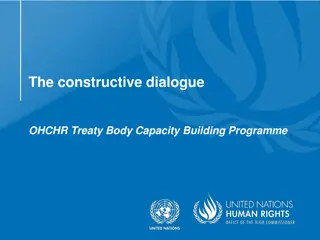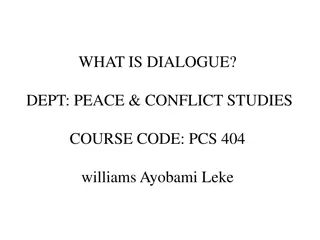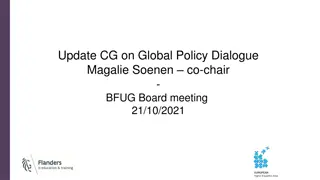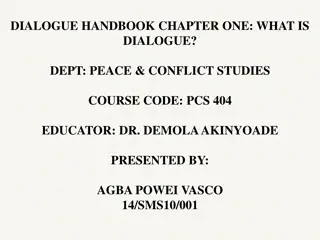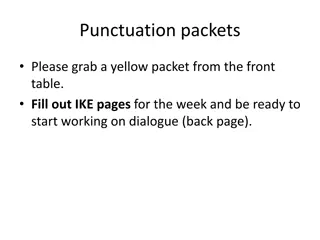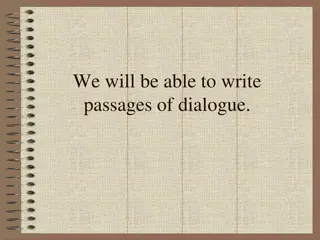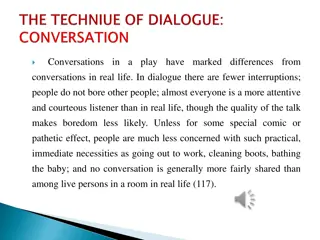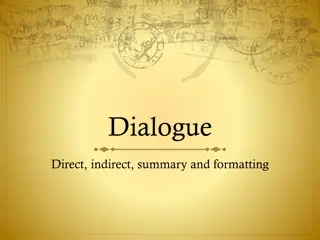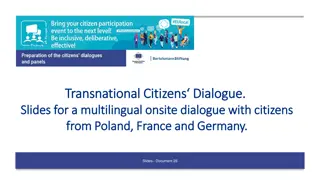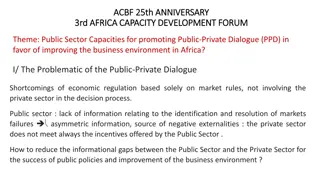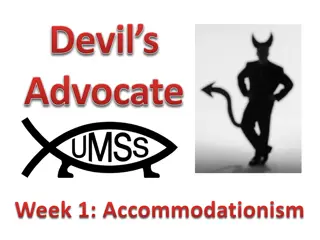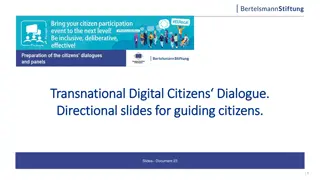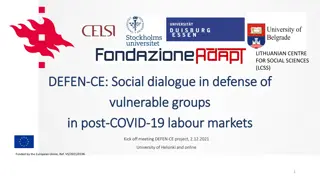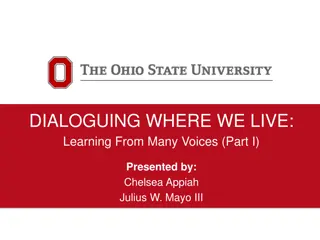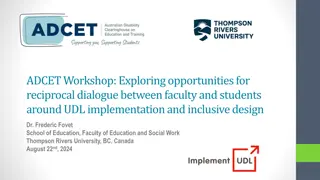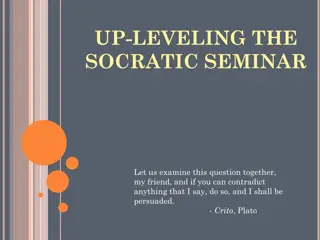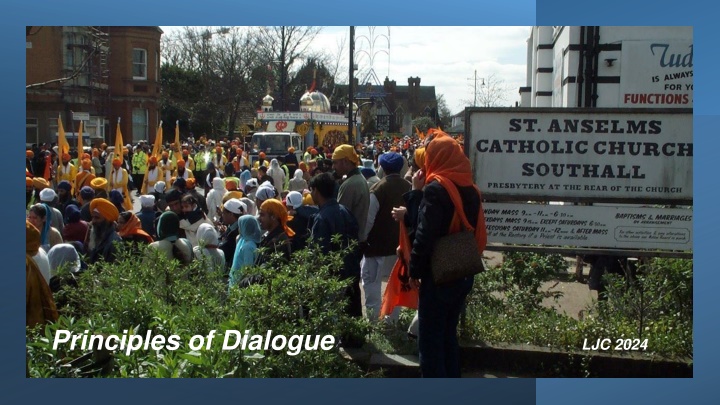
The Dialogical Language of Vatican II and Principles of Christian Dialogue
Explore the theological significance of dialogue in the context of Vatican II, Christian relations with non-Christians and Jews, and the Church's engagement with the modern world. Discover the pastoral dimension of Christian theology and the foundations of responsible Christianity in a pluralist society.
Download Presentation

Please find below an Image/Link to download the presentation.
The content on the website is provided AS IS for your information and personal use only. It may not be sold, licensed, or shared on other websites without obtaining consent from the author. If you encounter any issues during the download, it is possible that the publisher has removed the file from their server.
You are allowed to download the files provided on this website for personal or commercial use, subject to the condition that they are used lawfully. All files are the property of their respective owners.
The content on the website is provided AS IS for your information and personal use only. It may not be sold, licensed, or shared on other websites without obtaining consent from the author.
E N D
Presentation Transcript
September 25th The meaning and theological significance of dialogue: the dialogical language of Vatican II. October 2nd Christians and non-Christians: the salvation of the non-Christian . Lumen Gentium. October 9th Jews and Christians: the Church s relations with the Jewish people. Nostra Aetate and Dei Verbum. October 16th Church for the world: the pastoral dimension of Christian theology. Ad Gentes and Gaudiumet Spes October 23rd Being faithful and open: responsible Christianity in a pluralist world. Dignitatis Humanae.
Vatican II - Pastoral and Dialogical 1. Pope John wanted a pastoral Council, which would enable the Church to communicate God s truth more effectively. 2. Uniquely the documents of Vatican II are not canons but inspirational meditations. 3. Key themes repeated through texts, especially Church as People of God called to holiness both withinChurchand in relations without. 4. Documents to be read primarily as records of a process of listening to the Word of God as revealed in Church s dialogue with world.
Lumen Gentium: Church exists not apart but in relationship with others Dei Verbum: conciliar decrees reflecting God s own call of a People Nostra Aetate: in a pluralist world acknowledge, preserve and promote religious truths and values Ad Gentes: Church missionary of its very nature called to participate in Missio Dei Dignitatis Humanae: truth about human nature discovered in fitting manner
First use of dialogue in decree on Christian unity (Unitatis Redintegratio); at this stage a new term, not well understood. A way of building atmosphere of prayerful mutuality in order to understand different positions and foster honest and open communication. Pastoral Constitution onChurch in the Modern World (Gaudium et Spes) speaks of Church sharing joys and hopes of humankind and commitment to engage with practical issues from politics and war to marriage and culture. Dialogue used 8 times in Part 1 ( Church and Human Call ) and 8 in Part 2 ( Problems of Special Urgency ) two Latin words: dialogus and colloquium. Latter tends to predominate: Church can give no more striking evidence of feelings of concern and love towards the whole human family than by entering into conversation with it . (3) NB here no formal dialogus involved; no official parties; more an informal attitude of shared concern for human dignity.
The Platonic legacy the search for truth The Socratic method: bringing out the hidden truth which is already there, needing only the skilled teacher. Dialectic as tool for fashioning and confirming or refuting hypotheses about truth which belong in ideal world, away from or above the empirical world of the senses. When anyone tries by dialectic through the discourse of reason unaided by any of the senses to attain to what reality is and desists not until by sheer intelligence they apprehend the reality of good, then they stand at the real goal of the intelligible world. (Republic 532) Syllogistic reasoning became central tool of philosophical debate in Middle Ages under influence of scholastic philosophers in the wake of Aristotle s insistence on clear starting-points and logic of argument. Thomas Aquinas (1224-74): Summa Theologiae an ordered compendium of Sacra Doctrina; using Muslim and Jewish adaptations of Aristotle. Organised in terms of authorities and objections leading to systematic exposition of fundamental themes about God, creation and human nature.
The Buberian Influence the disclosure of truth Biblical and Hasidic influence: intense sensitivity to God of the everyday; everything can speak of God a mysticism of the everyday . Encounter with the other reveals very structure of reality; to be human is to be addressed and to respond with the biblical self-attestation Here am I . Applies to all relations. Truth belongs in between , to be born in encounter, in inter-personal I-Thou relationship which opens up between human beings. Dialogue as correlation of I and Thou; not a unity but like a bridge , a continuing duality with distinct poles but creating a unity in which polarities are acknowledged and overcome. Two interdependent modes of experience of unity-in-difference: orientation - using other as a traveller might use a map realisation - being touched by something other Ordinary life reveals potential for glimpses of another order, a life of meaning. The life of human beings is not passed in the sphere of transitive verbs alone. It does not exist in virtue of activities alone which have something for their object. I perceive something. I imagine something. I will something. I feel something. I think something. The life of human beings does not consist of all this and the like alone. This and the like together establish the realm of It. But the realm of Thou has a different basis. When Thou is spoken, the speaker has no thing for an object. (I and Thou pp 16-17)
It is the dialogical situation in which the human being stands that here finds its lofty or childlike expression. Judaism regards speech as a happening which reaches out over the existence of mankind and the world. In contradiction to the static of the Logos-idea the word appears here in its full dynamic as that which comes to pass. God s act of creation is speech; but also each lived moment is so. The world is spoken to the human beings who perceive it, and the life of man is itself a dialogue. What happens to a man are the great and the small, untransmittable but unmistakable signs of his being addressed; what he does and suffers can be an answer or a failure to answer. And thus the whole history of the world, the hidden, real world history, is a dialogue between God and his creature; a dialogue in which man is a true legitimate partner, who is entitled and empowered to speak his own independent word from out of his own being. I am far from wishing to contend that the conception and experience of the dialogical situation are confined to Judaism. But I am certain that no other community of human beings have entered with such strength and fervour into this experience as have the Jews. (The Faith of Judaism)
The Pauline Connection Ecclesiam Suam 1964: colloquium used 49 times as a vogue word to refer to the mental attitude which must inspire the Church s ministry to the dissonant, voluble, complex concert that is the contemporary world . Church s mission emerges from God s own colloquium salutis with humanity. The Church must enter into dialogue with the world in which lives. It has something to say, a message to give, a communication to make. (65) The whole history of our salvation is one long, varied dialogue, which marvelously begins with God and which He prolongs with human beings in so many different ways. (70) Dialogue clearly has instrumental connotations, a way of responding to the missionary mandate. But also theological in its own right: never used without precise reference to the salvific action of the self-revealing God. Dialogue being the confrontation of two friends before eternal truth, is a free exercise in which each swears to the other not to give way, except to the light. The dialogue which Paul VI recommends is not the somewhat abstract dialogue of philosophers, who are only preoccupied with themselves, but the real, concrete dialogue of humanity in search for truth in its deepest purity. Jean Guitton
Mission: Dialogue and Proclamation (1984, 1991) Context of post-Vatican 2 debate: tension between traditional form of mission as proclamation and emergence of dialogue as practice with distinctively theological overtones coming from theme of dialogue of salvation . The church feels itself called to dialogue principally because of its faith. In the Trinitarian mystery, Christian revelation allows us to glimpse in God a life of communion and interchange In God, the Father, we contemplate a pervasive love unlimited by space and time In God the Son we are given the Word and Wisdom in whom everything was already contained and subsisting even from the beginning of time In God, the Holy Spirit, our faith allows us to perceive the force of life and movement, and continuous regeneration by the Spirit who acts in the depth of people's consciences and accompanies them on the secret path of hearts toward the truth. (Mission and Dialogue 1984) While salvation offered in Christ, people are saved through the dictates of conscience and sincere practice of what is good in their own religious traditions . People share differently in single mystery of salvation; Holy Spirit may already havetouched others in an unknown way. Proclamation: the communication of the Gospel message. Dialogue: all activities aimed at 'mutual understanding and enrichment .
Inter-religious dialogue is a part of the Church's evangelizing mission. Understood as a method and means of mutual knowledge and enrichment, dialogue is not in opposition to the mission ad gentes; indeed, it has special links with that mission and is one of its expressions. Dialogue does not originate from tactical concerns or self-interest, but is an activity with its own guiding principles, requirements and dignity. It is demanded by deep respect for everything that has been brought about in human beings by the Spirit who blows where he wills. Through dialogue, the Church seeks to uncover the "seeds of the Word," a "ray of that truth which enlightens all people ; these are found in individuals and in the religious traditions of humankind. Dialogue is based on hope and love and will bear fruit in the Spirit. Other religions constitute a positive challenge for the Church: they stimulate her both to discover and acknowledge the signs of Christ's presence and of the working of the Spirit, as well as to examine more deeply her own identity and to bear witness to the fullness of Revelation which she has received for the good of all. This gives rise to the spirit which must enliven dialogue in the context of mission. Those engaged in this dialogue must be consistent with their own religious traditions and convictions and be open to understanding those of the other party without pretense or close-mindedness, but with truth, humility and frankness, knowing that dialogue can enrich each side. Dialogue leads to inner purification and conversion which, if pursued with docility to the Holy Spirit, will be spiritually fruitful. Pope John Paul II, Redemptoris Missio, 55-56
Dialogue needs to take place on a number of different levels and should not be limited to formal discussions. The dialogue of life involves simply living alongside one another and learning from one another in such a way as to grow in mutual knowledge and respect. The dialogue of action brings us together in concrete forms of collaboration, as we apply our religious insights to the task of promoting integral human development, working for peace, justice and the stewardship of creation. Then at the level of formal conversations, there is a need not only for theological exchange, but also sharing our spiritual riches, speaking of our experience of prayer and contemplation, and expressing to one another the joy of our encounter with divine love. Pope Benedict XVI, address to religious leaders, during his visit to the UK, Sept 2010 The Fourfold Dialogue Dialogue of Common Life face to face and side by side Dialogue of Common Action reconciliation for building of civic society Dialogue of Religious Experience prayerful witness to power of Holy Spirit Dialogue of Theological Exchange faithful learning between traditions
Raimon Panikkar: a dialogical dialogue (encounter of persons) must complement the dialectical dialogue (dialogue of doctrines, ideas etc). Dialectical dialogueis essentially a method for passing judgement on other's opinions, based ultimately on the principle of non-contradiction, and concerned to discriminate between objects. Dialogical dialogueis the experience of passing through or beyond the logical to confront the person as a subject who mediates meaning to the other. Two forms of dialogue are interdependent. People have particular interests and always talk about something - common concerns which lead beyond the will to power to trust in the person as the source of understanding. When a person thinks it is never a purely 'individualistic' process; it is always done in harmony with or reaction to the other the 'hard reality of an opposition, another will . The other is not just a source of 'opinions' but the meeting point for the understanding of opinions. This 'Thou' is not an 'alter ego', an extension of the self, with whom I share some sort of common essence etc, but one who calls. Persons in relation both challenge and support each other. Sense of self found in a dialogue in which 'I' and 'Thou' recognise essential relatedness: other 'not the same' but not totally other either.
Encounter with the other the stranger in your midst possible responses hostility or hospitality? Latin hostis and hospes: enemy and guest history of ambivalent response towards the stranger imperatives: Remember Do not be afraid hospitality and welcome can be transformative Can acting with compassion and generosity towards the stranger open up an encounter with God the totally Other ?
Theology for dialogue prepares the ground for the meeting of persons of faith at whatever level and addresses questions arising from within the home tradition as it seeks to articulate its faith Theology of dialogue reflects on the experience of being in dialogue, not just the questions which arise from the dialogue itself but the effect that the meeting has on the inner integrity of the home tradition - and how it affects outer relations.


